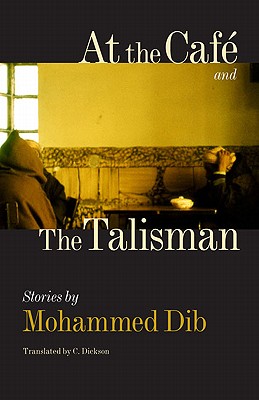At the Café and the Talisman

At the Café and the Talisman
Reflecting distinct and important stages in the career of the preeminent Algerian writer Mohammed Dib, "At the Café" and "The Talisman" brings together two collections that embroider on themes relating to the Algerian War for Independence (1954-1962). At the Café, published in 1955, is mostly realistic in style and illustrates particularly well Dib's uncanny talent for storytelling. The Talisman, published eleven years later, reflects Dib's growing penchant for relating his perception of the magical or mystical qualities underlying everyday reality.
When he wrote At the Café, Dib felt it was his duty to witness or testify on behalf of the downtrodden of Algeria under French colonial rule. Three stories in this collection--"Little Cousin," "A Fine Wedding," and "The Long Wait"--poignantly describe the rampant poverty, hunger, sickness, and despair that prevailed under French rule. In others, such as the titular story and "Forbidden Lands," Dib gives a voice to those who had been silenced but who were slowly learning to make themselves heard. On the eve of the war for independence, Dib felt obligated--as does the protagonist, Djeha, in "The Companion"--to take a stand on affirming one's role within the community and take action.
In The Talisman, Dib no longer feels the need to testify. Although colonialism and the brutality of war are still central threads, his treatment of them in this collection is more scathingly critical. Dib's style also shifts from the naturalism dominant in his earlier writing, showing a marked interest in the fantastic or magical. The under-lying themes in this collection take up, among other things, an obsession with the experience of death, a fascination with madness, the decrypting of symbols, the quest for a primordial language, and the possibilities of spiritual transcendence.
PRP: 155.00 Lei
Acesta este Prețul Recomandat de Producător. Prețul de vânzare al produsului este afișat mai jos.
124.00Lei
124.00Lei
155.00 LeiLivrare in 2-4 saptamani
Descrierea produsului
Reflecting distinct and important stages in the career of the preeminent Algerian writer Mohammed Dib, "At the Café" and "The Talisman" brings together two collections that embroider on themes relating to the Algerian War for Independence (1954-1962). At the Café, published in 1955, is mostly realistic in style and illustrates particularly well Dib's uncanny talent for storytelling. The Talisman, published eleven years later, reflects Dib's growing penchant for relating his perception of the magical or mystical qualities underlying everyday reality.
When he wrote At the Café, Dib felt it was his duty to witness or testify on behalf of the downtrodden of Algeria under French colonial rule. Three stories in this collection--"Little Cousin," "A Fine Wedding," and "The Long Wait"--poignantly describe the rampant poverty, hunger, sickness, and despair that prevailed under French rule. In others, such as the titular story and "Forbidden Lands," Dib gives a voice to those who had been silenced but who were slowly learning to make themselves heard. On the eve of the war for independence, Dib felt obligated--as does the protagonist, Djeha, in "The Companion"--to take a stand on affirming one's role within the community and take action.
In The Talisman, Dib no longer feels the need to testify. Although colonialism and the brutality of war are still central threads, his treatment of them in this collection is more scathingly critical. Dib's style also shifts from the naturalism dominant in his earlier writing, showing a marked interest in the fantastic or magical. The under-lying themes in this collection take up, among other things, an obsession with the experience of death, a fascination with madness, the decrypting of symbols, the quest for a primordial language, and the possibilities of spiritual transcendence.
Detaliile produsului









